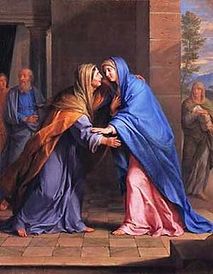
Visitation, by Philippe de Champaigne
St. John the Prophet
Today is an odd liturgical feast: the Nativity of St. John the Baptist. All other saints are commemorated on the day of their death – their birth into eternal life). The Church celebrates the nativity of only two other people: Jesus, on Christmas, and Mary, on September 8th. But Jesus called St. John “the greatest man born of woman,” the great prophet: not foretelling the future, but speaking God’s word in the present.
My life for the truth
John spoke the Word boldly amongst the political powers of his time. He did not fear to tell Herod that a man should not live with his brother’s wife. Everybody knewthat, but John said it, and knew that saying it would get him into trouble. The Church exercises an irreplaceable prophetic role in restraining political power. Political power is intoxicating and becomes absolute if not regulated. The founders of our country established a system of checks and balances between the three branches of government. But the authors of our Constitution also guaranteeing the free exercise of religion in the public square, to safeguard another means of governmental regulation. The churches help balance the power of the state, even as the state helps balance the effective exercise of religion. For some time now, though, Church and State have been at odds. As Mary Ann Glendon, Harvard Law Professor recently said, “At the deepest level, we are witnessing an attack on the institutions of civil society that are essential to limited government and are important buffers between the citizen and the all-powerful state.”
Fortnight
We are in a two-week period of prayer, study, and fasting called by our Bishops the Fortnight for Freedom, June 21-July 4. On Friday the Church commemorated St. Thomas More, Henry VIII’s Lord Chancellor, who resisted the King’s unreasonable demand to control the Church in England in 1530. King Henry beheaded Thomas More in 1533. More went to the scaffold calmly, saying: “I die the King’s good servant, but God’s first.”
We all want to be good servants of our republic, and good citizens of our state. Insisting, even with our lives and our property, that the State has no authority over certain areas of our lives is a high act of loyalty and patriotism. St. John the Baptist was beheaded in 30 AD for insisting on a moral authority above King Herod’s authority. St. Thomas More was beheaded in 1533 AD for insisting on a moral authority greater than King Henry’s authority.
We turn to our lady, the Mother of Jesus our Lord, who saw her own son executed by the Roman government for testifying to the truth. Let us pray through Mary to her Son to grace us with the wisdom, joy, and charity of the saints in our present moment.


 RSS Feed
RSS Feed